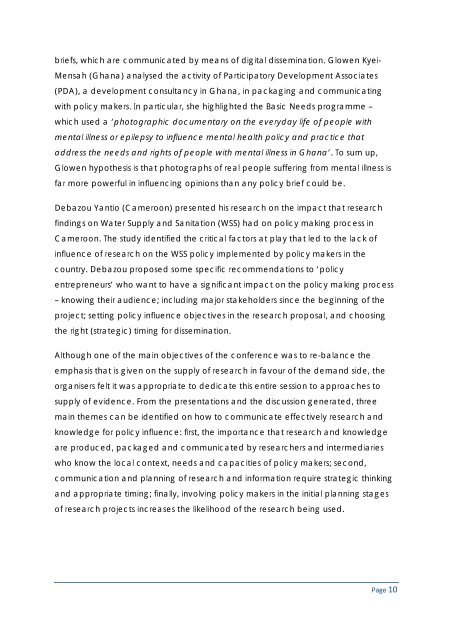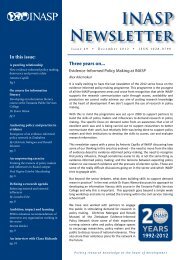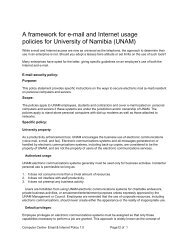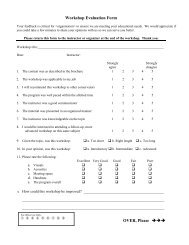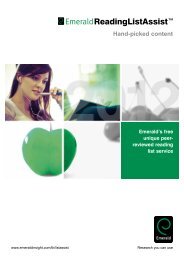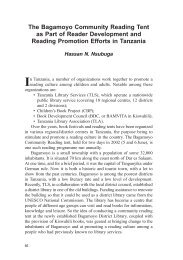What is the evidence on evidence-informed policy making? - INASP
What is the evidence on evidence-informed policy making? - INASP
What is the evidence on evidence-informed policy making? - INASP
You also want an ePaper? Increase the reach of your titles
YUMPU automatically turns print PDFs into web optimized ePapers that Google loves.
iefs, which are communicated by means of digital d<str<strong>on</strong>g>is</str<strong>on</strong>g>seminati<strong>on</strong>. Glowen Kyei-<br />
Mensah (Ghana) analysed <str<strong>on</strong>g>the</str<strong>on</strong>g> activity of Participatory Development Associates<br />
(PDA), a development c<strong>on</strong>sultancy in Ghana, in packaging and communicating<br />
with <strong>policy</strong> makers. In particular, she highlighted <str<strong>on</strong>g>the</str<strong>on</strong>g> Basic Needs programme –<br />
which used a ‘photographic documentary <strong>on</strong> <str<strong>on</strong>g>the</str<strong>on</strong>g> everyday life of people with<br />
mental illness or epilepsy to influence mental health <strong>policy</strong> and practice that<br />
address <str<strong>on</strong>g>the</str<strong>on</strong>g> needs and rights of people with mental illness in Ghana’. To sum up,<br />
Glowen hypo<str<strong>on</strong>g>the</str<strong>on</strong>g>s<str<strong>on</strong>g>is</str<strong>on</strong>g> <str<strong>on</strong>g>is</str<strong>on</strong>g> that photographs of real people suffering from mental illness <str<strong>on</strong>g>is</str<strong>on</strong>g><br />
far more powerful in influencing opini<strong>on</strong>s than any <strong>policy</strong> brief could be.<br />
Debazou Yantio (Camero<strong>on</strong>) presented h<str<strong>on</strong>g>is</str<strong>on</strong>g> research <strong>on</strong> <str<strong>on</strong>g>the</str<strong>on</strong>g> impact that research<br />
findings <strong>on</strong> Water Supply and Sanitati<strong>on</strong> (WSS) had <strong>on</strong> <strong>policy</strong> <strong>making</strong> process in<br />
Camero<strong>on</strong>. The study identified <str<strong>on</strong>g>the</str<strong>on</strong>g> critical factors at play that led to <str<strong>on</strong>g>the</str<strong>on</strong>g> lack of<br />
influence of research <strong>on</strong> <str<strong>on</strong>g>the</str<strong>on</strong>g> WSS <strong>policy</strong> implemented by <strong>policy</strong> makers in <str<strong>on</strong>g>the</str<strong>on</strong>g><br />
country. Debazou proposed some specific recommendati<strong>on</strong>s to ‘<strong>policy</strong><br />
entrepreneurs’ who want to have a significant impact <strong>on</strong> <str<strong>on</strong>g>the</str<strong>on</strong>g> <strong>policy</strong> <strong>making</strong> process<br />
– knowing <str<strong>on</strong>g>the</str<strong>on</strong>g>ir audience; including major stakeholders since <str<strong>on</strong>g>the</str<strong>on</strong>g> beginning of <str<strong>on</strong>g>the</str<strong>on</strong>g><br />
project; setting <strong>policy</strong> influence objectives in <str<strong>on</strong>g>the</str<strong>on</strong>g> research proposal, and choosing<br />
<str<strong>on</strong>g>the</str<strong>on</strong>g> right (strategic) timing for d<str<strong>on</strong>g>is</str<strong>on</strong>g>seminati<strong>on</strong>.<br />
Although <strong>on</strong>e of <str<strong>on</strong>g>the</str<strong>on</strong>g> main objectives of <str<strong>on</strong>g>the</str<strong>on</strong>g> c<strong>on</strong>ference was to re-balance <str<strong>on</strong>g>the</str<strong>on</strong>g><br />
emphas<str<strong>on</strong>g>is</str<strong>on</strong>g> that <str<strong>on</strong>g>is</str<strong>on</strong>g> given <strong>on</strong> <str<strong>on</strong>g>the</str<strong>on</strong>g> supply of research in favour of <str<strong>on</strong>g>the</str<strong>on</strong>g> demand side, <str<strong>on</strong>g>the</str<strong>on</strong>g><br />
organ<str<strong>on</strong>g>is</str<strong>on</strong>g>ers felt it was appropriate to dedicate th<str<strong>on</strong>g>is</str<strong>on</strong>g> entire sessi<strong>on</strong> to approaches to<br />
supply of <str<strong>on</strong>g>evidence</str<strong>on</strong>g>. From <str<strong>on</strong>g>the</str<strong>on</strong>g> presentati<strong>on</strong>s and <str<strong>on</strong>g>the</str<strong>on</strong>g> d<str<strong>on</strong>g>is</str<strong>on</strong>g>cussi<strong>on</strong> generated, three<br />
main <str<strong>on</strong>g>the</str<strong>on</strong>g>mes can be identified <strong>on</strong> how to communicate effectively research and<br />
knowledge for <strong>policy</strong> influence: first, <str<strong>on</strong>g>the</str<strong>on</strong>g> importance that research and knowledge<br />
are produced, packaged and communicated by researchers and intermediaries<br />
who know <str<strong>on</strong>g>the</str<strong>on</strong>g> local c<strong>on</strong>text, needs and capacities of <strong>policy</strong> makers; sec<strong>on</strong>d,<br />
communicati<strong>on</strong> and planning of research and informati<strong>on</strong> require strategic thinking<br />
and appropriate timing; finally, involving <strong>policy</strong> makers in <str<strong>on</strong>g>the</str<strong>on</strong>g> initial planning stages<br />
of research projects increases <str<strong>on</strong>g>the</str<strong>on</strong>g> likelihood of <str<strong>on</strong>g>the</str<strong>on</strong>g> research being used.<br />
Page 10


